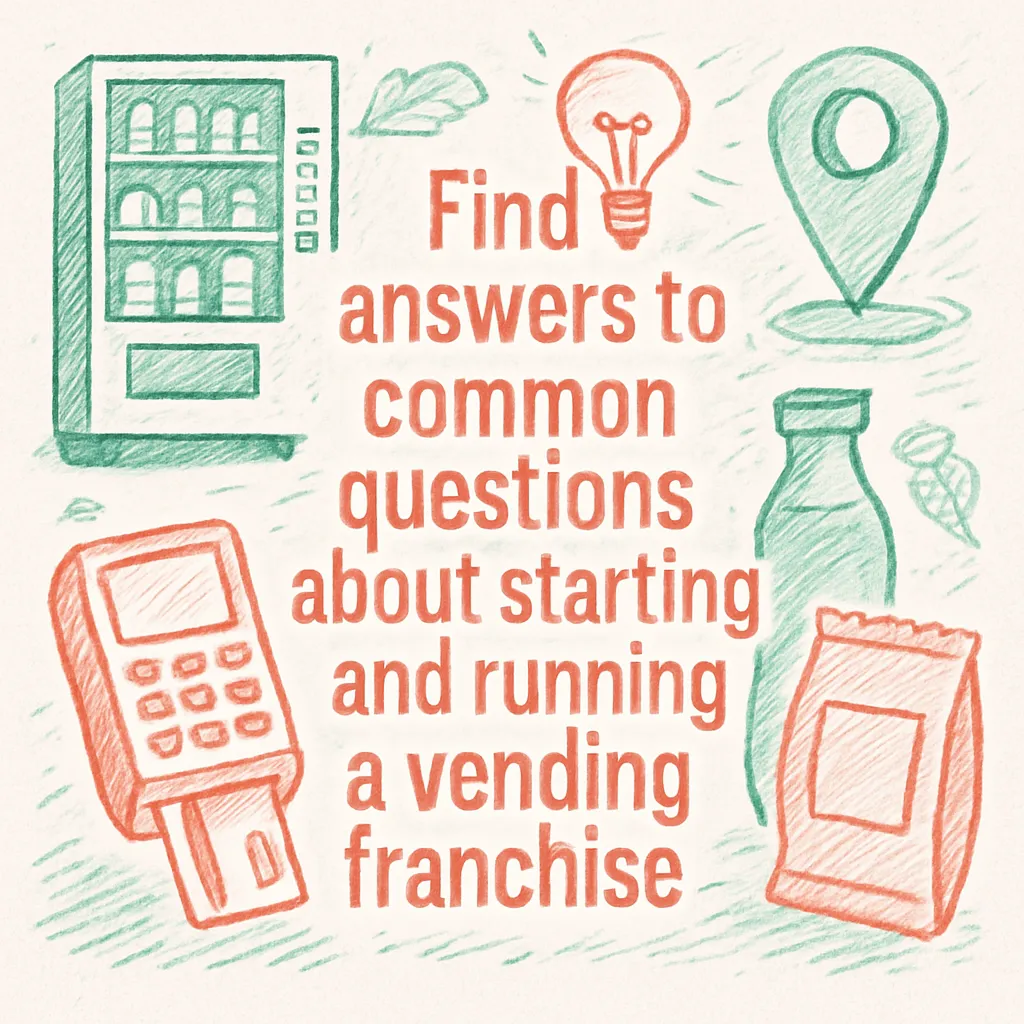Vending Franchise FAQ
Find answers to common questions about starting and running a vending franchise.
Back to Vending Franchises ResourcesFind answers to common questions about starting and running a vending franchise.
Back to Vending Franchises ResourcesStart your 30-day free trial and get instant SMS and email alerts whenever a local business needs vending service. These are real location leads to help you grow your route — you decide which ones to buy, no obligations or contracts.
![]() Gain insights into franchise benefits and support systems
Gain insights into franchise benefits and support systems
![]() Understand startup costs and financial considerations
Understand startup costs and financial considerations
![]() Learn how franchisors assist with location and operation
Learn how franchisors assist with location and operation
30 days free, then $39 / month.
No Commitment. Cancel Anytime.

Embarking on a vending franchise journey can be a path to entrepreneurial success, offering a blend of independence and established support. A franchise provides a proven business model, reducing the risks common with new startups. This structure often includes assistance with finding vending machine locations, comprehensive training, and access to a trusted brand, which collectively contribute to a smoother launch and sustained operation.
One of the primary advantages of a vending franchise is the access to an existing operational framework. This means you typically receive guidance on everything from selecting the right machines to stocking them efficiently. For instance, understanding how to stock your first vending machine can be less daunting with franchisor support, which often includes product recommendations based on market data and successful past performance. Furthermore, many franchisors offer continuous marketing and technical support, which can be invaluable.
Before committing, it's crucial to understand the financial implications, including franchise fees, initial investment for machines and inventory, and ongoing royalties. Prospective franchisees should also evaluate the level of competition in their target area and the type of vending services they wish to provide. Whether you're interested in healthy vending, office coffee services, or traditional snack and beverage machines, the franchise model can often streamline the procurement process and offer vending machine financing options. Researching these aspects thoroughly ensures alignment with your business goals and financial capabilities.
Vending Exchange connects vending operators with real businesses actively looking for vending services—including traditional machines, AI coolers, and office coffee. Get instant SMS and email alerts when new opportunities are available in your area. No contracts or monthly fees—just buy the leads you want. Start your free 30-day trial today and grow your vending business on your terms.
A vending machine franchise typically involves buying into an established vending business model, often with brand recognition, training, and support from the franchisor.
Franchises offer a proven business model, established supply chains, marketing support, and initial training, which can reduce the risks associated with a new venture.
Startup costs can vary widely but generally include franchise fees, initial inventory, machine purchases, location acquisition, and working capital. These can range from a few thousand to tens of thousands of dollars.
Most vending franchises do not require prior experience, as they provide comprehensive training, operational manuals, and ongoing support for their franchisees.
Many franchisors offer assistance with location scouting and negotiation, leveraging their experience and contacts to help franchisees secure profitable placements.
Ongoing support often includes marketing assistance, operational guidance, technical support for machines, product sourcing, and continued training.
Profit margins can vary based on factors like machine type, product selection, location, and operational efficiency. Franchisors may provide detailed financial disclosures to prospective franchisees.
Yes, franchises can specialize in various sectors such as healthy vending, coffee services, full-service combo machines, or micro markets, each with its own niche.
The time commitment can range from part-time to full-time, depending on the scale of the operation, the number of machines, and whether you hire employees to assist with servicing.
Challenges can include maintaining machine uptime, managing inventory, adapting to product trends, and securing new profitable locations. However, franchisors provide strategies to overcome these.